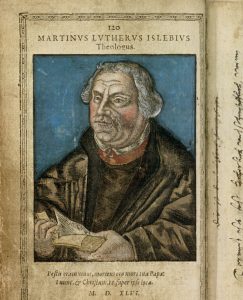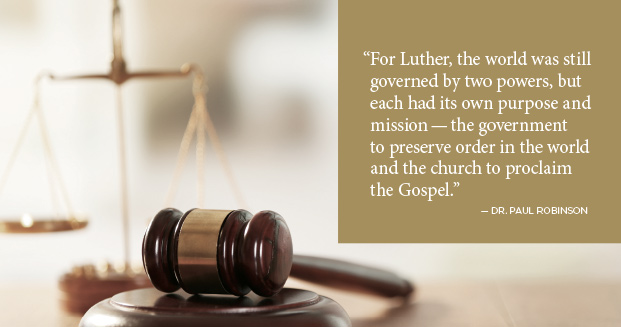
Concordia Seminary Newsroom
The Reformation and Politics

By Paul Robinson
The Reformation had to be a political event. Though we might think of the Reformation in spiritual terms and view its legacy primarily as a renewed understanding of the Gospel, the work of Christ, and the role of Scripture in the life of the church, the reformers themselves had no choice but to be involved in politics. Some took to the political aspects of reform with more gusto than others. Of the three major reformers, Martin Luther was wariest of political involvement. Although he appealed to the princes to institute his reforms, he did not trust politics to achieve the aims of his reformation.

This image of Luther comes from a copy of “Icones sive imagines virorum literis illustrium”, published in 1590 by Nikolaus Reusner, which can be found in the Concordia Seminary library
The Reformation had to be political because the medieval church had become a political power and the popes had claimed authority over the secular rulers. When the Roman Empire ceased to exist in the West at the end of the fifth century, the church there found itself in the position of being independent of the political order for the first time since Constantine became emperor. Even when the empire was renewed by Charlemagne in 800, the West was governed, at least in theory, by two powers — church and empire. Medieval political thought was consumed by the rival claims of these two powers and with answering the persistent question of which was preeminent, and medieval politics featured vicious warfare between papal and imperial factions.
The church not only claimed power in theory but strove to practice it and penetrated every aspect of life with its regulations.
Here are only a few examples of the variety and extent of church legislation:
- Marriage was regulated by the church.
- Any lawsuit that involved a member of the clergy was to be tried in a church court.
- Fasting during Lent was enforced by law.
- The pope ordered that the crossbow not be used in war against other Christians.
In other words, medieval Christianity, though it could certainly be a matter of faith and devotion, was also, most certainly, a matter of subjection to a political order.

Martin Luther set out to correct this situation. He believed European rulers were suffering from an identity crisis. “The princes want to be bishops, and the bishops want to be princes,” he wrote in 1523 in On Secular Authority. This treatise is his most famous statement of what has come to be known as the two kingdoms doctrine. He rejected the idea that the Roman church should be a political power, owning vast amounts of land and making its own rules. He also rejected the idea that secular rulers should enforce matters of belief by coercion. Instead, he upheld secular government as established by God. This was a radical statement at the time, because the church had asserted that secular rulers couldn’t even be good Christians since they had to enforce laws with violence. Luther claimed instead that God had established government and the vocation of ruler to carry out his purposes in the world, even if those were purposes of applying the law. For Luther, the world was still governed by two powers, but each had its own purpose and mission — the government to preserve order in the world and the church to proclaim the Gospel. Rulers were freed from the overreach and oversight of the church in political matters, but also were to allow the church its own freedom to preach and teach.
For Luther, the individual Christian stands under both government and church and has duties in both realms. As he well knew, this reality frequently created problems when the claims of church and government conflicted. Luther wrote On Secular Authority, in part, precisely because of such a conflict. His German New Testament had just been printed, and people throughout Germany were reading it. This did not sit well with some Catholic rulers and several territories ordered their citizens to surrender their copies. Luther advised that they absolutely refuse because, in this case, the government was overstepping the boundaries of its authority. Luther also warned, however, that those who defied the government had to be prepared to suffer the consequences. Violent resistance was not an option.
Secular authorities emerged from the Reformation stronger than ever. The Peace of Augsburg (1555) settled, at least temporarily, religious conflict in Germany by giving rulers the right to choose whether their territories would be Lutheran or Catholic. One of the unintended consequences of Luther’s ideas was a greater divide between the sacred and the secular, with what was owed to government, the secular, becoming more prominent.
It could even be said that the American experiment of rejecting the establishment of a state church also owes something to Luther’s thought. American democracy, however, has made the situation of individual Christians and their relationship to the government more complicated than it was in Luther’s day. In Luther’s Saxony, the word of the prince was law, and the only choice was to obey or not. Citizens had no say in the government and no part in making the laws. Luther believed that resistance to a ruler by private individuals was always sinful. How different is the situation in the United States today! The idea that the citizens are themselves the government adds to the choices they have when confronted with policies and laws with which they disagree. So Christians, too, face far more difficult choices when it comes to interacting with the government and a wider field for disagreement among themselves — not just over particular issues but also over how to respond.
We don’t know exactly what Luther would say about our situation today, but he fervently believed that Christians had the duty and the freedom in the Gospel to live as citizens and even to serve in government, engaging actively in the world of politics.